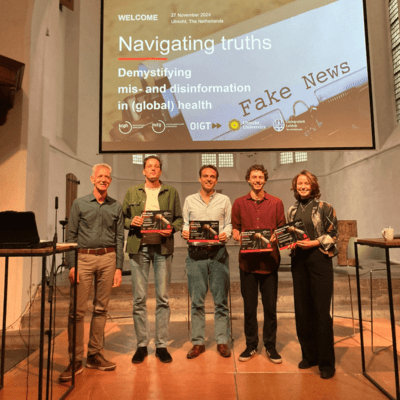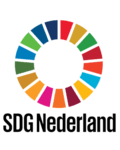From recognition to impact: Where are the 2024 KCGH Thesis & PhD Prize winners now?
 Submissions are now open for the KCGH Thesis & PhD Prize 2025, and if you're still wondering whether it’s worth sending in your thesis or dissertation, let last year’s winners convince you.
Submissions are now open for the KCGH Thesis & PhD Prize 2025, and if you're still wondering whether it’s worth sending in your thesis or dissertation, let last year’s winners convince you.
In 2024, we received a record number of high-quality submissions, 36 in total, showcasing the breadth and depth of research being done in global health by recent graduates. The winners, selected by an expert jury, each brought fresh perspectives to urgent global health challenges. Now, almost a year later, we asked them: What did winning the prize mean for you, and what came next?
Tom Jacobs
PhD Dissertation (Global Child Health): Accelerating access to optimal anti-infective treatment for children living with HIV
“Winning the prize was a real honour. It gave me valuable recognition and the chance to connect with others working in global child health and access to medicines,” says Tom Jacobs, whose PhD focused on improving HIV treatment options for children in low-income countries.
Tom used the prize money to extend a research visit to Uganda, where he reconnected with colleagues and explored new opportunities for collaboration. Since receiving the award, he has become a co-applicant on two large clinical studies on paediatric HIV treatment, joined the WHO Paediatric Antiretroviral Working Group, and taken on a supervisory role with three PhD candidates: two in the Netherlands and one in Zimbabwe.
Lennart Maljaars
PhD Dissertation: Surgical care and innovation for vesicovaginal fistula
For Lennart Maljaars, the prize offered recognition and a valuable opportunity to broaden his network: “I was very happy to receive the prize and to connect to a broader global health community in addition to the obstetrics and gynaecology departments where I conducted my research.”
While he hasn’t yet spent the prize money, Lennart plans to join a fistula surgeon in the field, gaining firsthand experience that complements his academic and clinical career. Meanwhile, he is preparing a publication based on a consensus project he chaired, in collaboration with a fistula expert. “We are about to publish a paper on the outcome of obstetric urinary pelvic floor fistulas, supported by the International Urogynaecology Association (IUGA) and the International Continence Society (ICS). I’m very proud of this project and hope to continue working on this topic throughout my career.”
Lara Schmale-Hüsemann
Bachelor’s Thesis: Health equity analysis of the Africa CDC strategy on non-communicable diseases
“Winning the prize was quite a recognition – not only for my individual work and that of the other awardees, but also for the diversity of research areas within global health,” says Lara Schmale-Hüsemann. Her thesis critically examined how equity principles are integrated into non-communicable disease strategies by the Africa CDC. “I was happy to see that health equity is not only mainstreamed but regarded as a vital topic in its own right.”
Since receiving the prize, Lara completed an internship with the German development agency GIZ, advising on Germany’s approach to feminist and equitable development policy. Here, she could integrate many insights from her thesis and actively apply health lenses to the policies and processes in question. She plans to use the prize money to support her research during her master’s, ideally focusing on participant-based or implementation research.
Robert Dasović
Master’s Thesis: Unheard Voices: Navigating the life course of people experiencing homelessness in a fragmented health system
For Robert Dasović, the KCGH Thesis Prize served as a strong motivation to keep going. “It has been a wonderful encouragement to continue deepening this line of research,” he says. His thesis explored the lived experiences of people experiencing homelessness in Rotterdam, using Life History Interviewing and Life Mapping to explore how trauma, exclusion, and systemic neglect contribute to homelessness.
Robert used the prize money in a gesture true to the ethos of his research, sharing meals with his respondents to thank them for sharing their stories with him. Since then, he has expanded the project into a realist review of international literature on health outcomes among people experiencing homelessness. “I’m analysing which contexts and mechanisms shape different health outcomes. The goal is to generate actionable insights for care design and policy – and this deeper synthesis is helping shape my future research direction.”
A launchpad for early-career researchers
These reflections show how the KCGH Thesis & PhD Prize is more than a one-time recognition – it serves as a launchpad. Whether by funding fieldwork, increasing visibility, facilitating new connections, or simply providing the motivation to continue, the prize supports the next generation of researchers and professionals working to advance global health. We are proud to follow the journeys of our 2024 winners and look forward to meeting this year’s cohort.
Submit your work for 2025
Do you have a thesis or dissertation that deserves the spotlight? Submit your work before October 1st, 2025, to ofni.[antispam].@kcgh.nl and be part of this year’s edition.
You can find full prize categories and eligibility here.

